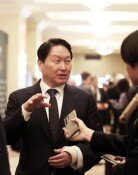Opening Rice Market Is Inevitable
Opening Rice Market Is Inevitable
Posted June. 14, 2005 03:02,
It was discovered that ahead of the next round of rice negotiations, the government had accepted unreasonable demands, feeling the potential backlash from farmers while considering a market opening through tariffs to be more profitable.
It was revealed that the government had made concessions to many countries, including making the verbal promise of well try to fulfill your demands to the U.S., which had requested Korea to secure its rice market share.
The above mentioned matter is detailed in eight government internal documents related to the rice negotiations and was confirmed by Dong-A Ilbo on June 13.
The Ministry of Agriculture and Forestry said in its analysis of the merits and demerits of delaying the timing of the rice market opening in December 2003 that its unrealistic to expect a safe negotiation that bears no possibility of criticism afterward, and evaluated that when Korea has a large amount of rice in inventory, accepting a foreign countrys unfair demands could be more disadvantageous than opening the rice market.
Back in October 2004, at a Ministerial Meeting for International Economy, an analysis released by the Korea Rural Economic Institute (KREI) showed that opening the rice market would be more lucrative than holding separate negotiations with individual countries.
The analysis says that once the rice market is opened, rice imports subject to low tariffs will account for just 7.1 percent to 7.5 percent of total rice consumption by 2014. But if the opening is delayed, the analysis says Korea should annually import around 8.0 percent of its rice. In fact, in the current rice negotiations, Koreas compulsory rice import ratio is fixed at 7.96 percent.
At the meeting, the government straightened its position out by saying, If Korea opens its rice market later, Korea will inevitably have the burden of importing rice in large quantities at the same time.
In addition, the government verbally promised the U.S., its largest negotiation partner, that it would make a good faith effort in order to raise the U.S.s imported rice market share by 2014.
The Korean ambassador to the U.S. delivered the above matter to high-ranking officials of the United States Trade Representative (USTR).
Subsequently, if the market share falls short of the U.S.s expectations, it could develop into a commerce dispute between the two countries.
The U.S., in the process of the negotiations, demanded Korea secure its rice market share at 31 percent of total rice imports by 2014.
The government also delivered a letter under the name of the head of the National Veterinary Research and Quarantine Service (NVRQS) indicating that Korea will complete inspections of imports of Argentine chickens by the end of June this year.
Although the import timing was postponed as Argentina failed to submit a document related to quarantine afterward, Argentine chicken could have made inroads into the Korean market at the cost of the rice negotiations.
legman@donga.com







